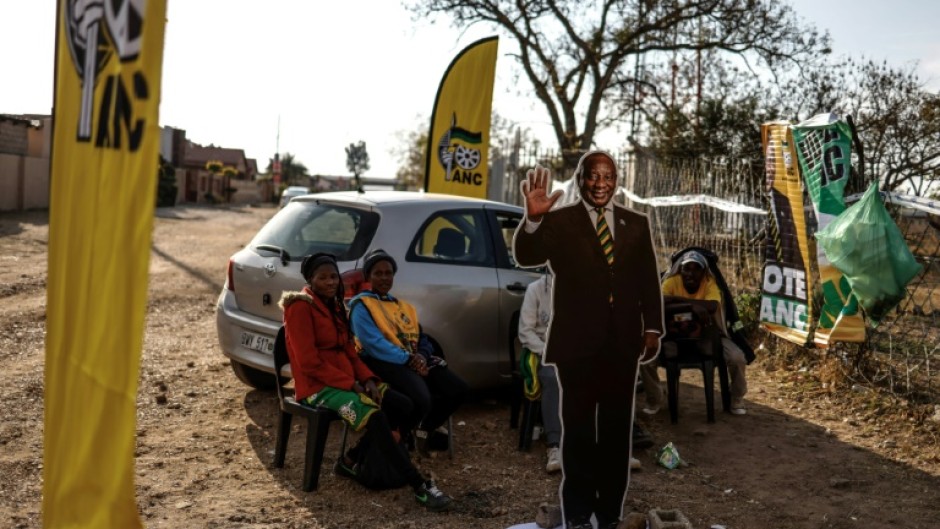JOHANNESBURG - The ANC, which has governed South Africa for three decades, is on course to lose its outright majority for the first time after elections this week, portending a period of unprecedented political uncertainty.
The party, once led by liberation hero Nelson Mandela, looks set to remain the single biggest party but win less than 50 percent of the vote, forcing it to seek a coalition.
Analysts say a likely alliance will depend on how far the African National Congress (ANC) falls short of a clear majority, with final results expected in the next couple of days.
Here are some of the possible tie-ups that the party led by President Cyril Ramaphosa could negotiate:
- Court estranged stalwarts -
With more than two-thirds of the votes counted, the ANC was leading with less than 42 percent -- 15 points down on 2019 -- followed by the centre-right Democratic Alliance (DA) on 22 percent.
Behind them are two former ANC stalwarts: former president Jacob Zuma's uMkhonto weSizwe (MK) on 12 percent and leftist firebrand Julius Malema's Economic Freedom Fighters (EFF) on nine percent.
Malema founded the EFF in 2013 after being thrown out of the ANC, where he had served as youth leader but was accused of fomenting party divisions.
Zuma, a charismatic anti-apartheid fighter, also founded his party after being ousted from the ANC and has clawed into the veteran party's support in his home province of KwaZulu-Natal.
Depending on the ANC's final tally, it could call on either the MK or the EFF -- or both in a scenario predicted by analysts to likely be unstable.
"The EFF are just too erratic, too unpredictable in the type of demand they make," author and analyst Susan Booysen said, adding that the fallout between Ramaphosa and Zuma "is just too far reaching".
But a deal between the parties cannot be ruled out.
"It wouldn't be difficult for them to form a coalition because they have similar policies and similar tendencies," said Siphamandla Zondi, politics professor at University of Johannesburg.
In 2008, Zuma himself declared that the ANC would "rule until Jesus comes back".
- Unite with main challenger -
The ANC could have no choice but to co-opt the official centre-right opposition into a national coalition government, despite the DA's fierce criticism of their rule.
The DA itself was banking on forming a coalition of smaller outfits to "rescue South Africa".
It has dubbed a possible deal between the ANC, EFF and MK a "Doomsday Coalition" that will wallow in chaos and corruption.
The price for a deal with the DA could prove costly with significant policy concessions, analysts say.
The DA has vowed to roll back the ANC's race-based economic empowerment programmes and to boost growth through privatisation and deregulation.
"It sounds a bit far-fetched at some level but maybe that is the direction they will be going," Booysen told AFP.
Christopher Vandome, a senior research fellow at London-based Chatham House think tank, agrees.
"There are very senior voices inside the party pushing for a centrist coalition or an agreement of supplying confidence with the DA," he told AFP, adding that they could keep Ramaphosa as president and give some positions to the DA.
But he predicted that negotiations would be "bumpy" for all parties.
- Turn to smaller parties -
If the ANC ends up close to the 50-percent mark, it could approach a number of smaller parties, many of them expected to earn just a few percent of the vote.
A projection by the Council of Scientific and Industrial Research (CSIR) indicated the ANC was in line to win less than 42 percent, rendering the scenario less likely.
Currently, the Zulu nationalist Inkatha Freedom Party and anti-immigration Patriotic Alliance have managed more than two percent of the votes.
The rest of the more than 40 registered political parties have one percent or less.
The small parties will nonetheless have a big say in the "substantially" changed political landscape, political analyst Daniel Silke said.
"The ANC is now the largest party but no longer the dominant political party," he said.
By Hillary Orinde

